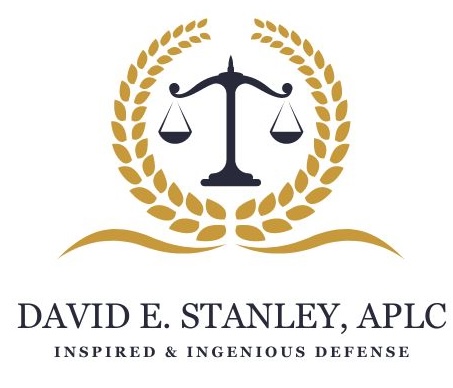Murder Defense:
How Can a Lawyer Help
Facing a murder charge can be a devastating experience with life-altering consequences. It’s crucial to understand that you’re not alone in this battle. A qualified defense attorney can offer valuable advice and support to safeguard your rights and pursue a favorable outcome.

At David Stanley Law, we recognize the severity of murder charges and the significant stress they cause—our legal team in Baton Rouge, LA, tailors defense strategies to each unique case. If you or a loved one faces a murder charge, call us immediately. We are here to support you during this challenging time.
What Are the Different Types of Murder Defenses?
Table of Contents
ToggleMurder defense encompasses various legal strategies that challenge accusations. It aims to prove the defendant did not commit the crime or had a valid justification for their actions. Definitions of murder differ across jurisdictions but typically refer to the intentional or premeditated killing of another person. Understanding these nuances is crucial for crafting an effective defense.
Self-Defense
Self-defense argues that the defendant acted to protect themselves from imminent harm. To succeed, the defendant must demonstrate a reasonable belief in immediate danger and that their response was proportional to the threat. Legal standards for self-defense vary but typically require evidence of an imminent threat, a reasonable perception of risk, and no safe retreat option.
Insanity Defense
The insanity defense claims the defendant could not understand the wrongfulness of their actions due to a severe mental disorder at the time of the crime. The defense team must provide substantial psychiatric evaluation and credible testimony to support this claim. Legal standards vary by jurisdiction but generally focus on the defendant’s mental state during the crime.
Duress Defense
A defendant can use a duress defense to argue that threats of immediate harm compelled them to commit murder. They must prove that the danger was imminent, there was no safe escape, and the damage they avoided was more severe than the harm inflicted.
Mistaken Identity
Mistaken identity asserts that the defendant did not commit the crime. This defense can be complex, requiring a thorough investigation and evidence to identify the actual perpetrator. Key components include witness misidentification and the absence of physical evidence linking the defendant to the crime scene.
Justifiable Homicide
Justifiable homicide occurs when a person kills under legally permissible conditions, such as self-defense or defense of others. To establish justifiable homicide, the defendant must demonstrate the necessity of their actions and a reasonable belief in that necessity.
Legal Consequences of Murder Defense
Understanding the potential legal outcomes is crucial for anyone facing murder charges. Here’s what may happen with successful and unsuccessful defenses.
Successful Murder Defense
A successful defense could lead to:
Acquittal
Acquittal occurs when the jury or judge finds the defendant not guilty, clearing all charges and allowing the defendant to proceed without a criminal record. Acquittal often happens when the defense successfully challenges the evidence against them.
Reduced Charges
Sometimes, murder charges can be reduced to a lesser offense like manslaughter if there’s evidence the act wasn’t planned or happened in a moment of intense emotion. Reduced charges usually mean lighter penalties.
Dismissal of Charges
Insufficient evidence or legal mistakes can lead to the complete dismissal of charges, freeing the defendant from further prosecution.
Probation or Alternative Sentencing
In cases with exceptional circumstances, a successful defense might result in probation or punishment that doesn’t involve going to prison.
Unsuccessful Murder Defense
An unsuccessful defense could result in:
Conviction
Conviction is the worst outcome, where the defendant is found guilty. Depending on how severe the crime is, this could mean many years in prison, life without parole, or even the death penalty.
Severe Sentencing
If convicted, the punishment might be harsh, including a lengthy jail sentence or the death penalty, depending on the nature of the crime and the defendant’s background.
Loss of Rights and Opportunities
A murder conviction can take away rights like voting or owning a gun, and it can make it hard to find a job or a place to live.
Emotional and Psychological Impact
Besides the legal consequences, a conviction can cause deep emotional pain and hurt relationships with family and friends.

What Is the Role of a Lawyer in Murder Defense?
Lawyers play a vital role in murder defense cases, providing knowledge that significantly impacts the outcome. Here’s why legal representation is essential:
Knowledge and Experience
Criminal defense attorneys have a deep understanding of the laws and procedures related to murder cases. This knowledge is crucial for navigating the intricacies of the legal system and crafting effective defense strategies.
Strategic Planning
Attorneys conduct thorough investigations, review evidence, and devise tailored defense tactics. They identify weaknesses in the prosecution’s case, challenge evidence, and present compelling arguments for their clients.
Protection of Rights
Lawyers safeguard the defendant’s constitutional rights throughout the legal process. They protect against procedural errors, unlawful searches, coerced confessions, and other violations that could jeopardize the case.
Negotiation and Advocacy
Legal representation involves negotiating favorable plea deals with prosecutors and advocating for clients in court. Lawyers work to achieve favorable outcomes like acquittal, reduced charges, or alternative sentencing.
Emotional Support
Facing murder charges is emotionally challenging. Legal professionals offer guidance and support to clients and their families as they navigate legal matters.
Understanding murder defense and its various strategies is crucial for anyone confronting severe allegations. A qualified lawyer is essential for navigating the complexities of the legal system and advocating for a favorable outcome.
Frequently Asked Questions
What Is Murder Defense?
Murder defense refers to the legal strategies and arguments used to defend individuals accused of murder. It aims to challenge the prosecution’s evidence, establish the defendant’s innocence, or justify their actions.
What Are the Common Types of Murder Defenses?
Common types of murder defenses include self-defense, insanity defense, duress defense, mistaken identity, and justifiable homicide. Each defense relies on specific legal principles and evidence.
How Can a Lawyer Help in Murder Defense?
A lawyer aids in murder defense by providing critical legal representation, including case analysis, investigation, courtroom advocacy, negotiation with prosecutors, and safeguarding the defendant’s rights.
Murder Defense Attorney

Our team is committed to personalized and effective defense strategies at David Stanley Law. We work tirelessly to uncover every detail, challenge the prosecution’s evidence, and advocate for our clients’ rights. If you or a loved one are facing murder charges, contact us immediately. We are here to offer the support and defense you need.
David E. Stanley, APLC
1055 Laurel Street, Suite 2 Baton Rouge, LA 70802
225-926-0200

David Stanley is the founder and principal of David E. Stanley APLC. Since 1983, Mr. Stanley has successfully practiced law from his office in Baton Rouge, Louisiana.

